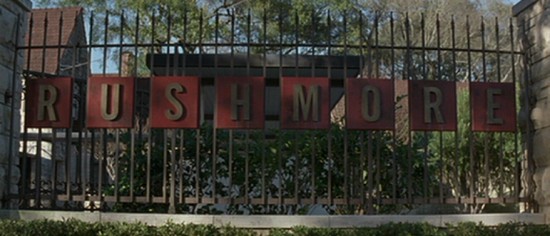
I don't have as much to say as usual. I put this on to end another long night of writing. Mostly I put it on to see one scene very early -- Max Fischer seeing Miss Cross for the first time, since so much of the movie is carried by his ridiculous, unrealistic, unrequited love for her. Rushmore is about a precocious dreamer who really doesn't understand how real people act in a real society, but whose tenacity is an unstoppable force. His inability to grasp that he can't get his way is the main ingredient of his success. There's something similar in the hearts of Max Fischer and my script's main character, though I'm not sure which is the more exaggerated version.
As Wes Anderson films go, this one feels more emotional than the rest, and in a weird way probably his most personal -- there's something honest and self-deprecatingly two-sided in the depiction of Max's insularity and the limitation of being so sure of your own dreams that might speak to the filmmaker himself and the nature of his output.
I also noticed a lot of odd cuts in this film, sloppy cuts on action to too-similar framings that on the one hand smacked slightly of a filmmaker still finding himself and not quite mastering his craft, but on the other hand came off as refreshingly uncontrolled and raw compared to the too-tight artificiality of his later projects, which added a right kind of plucky Max Fischerness to the film.
Last quick, disconnected comment: I do believe we get to watch Bill Murray actually act here, something I know the man can do but I tend to think he doesn't like to unless he has to -- he seems perfectly comfortable to coast through a film "being Bill Murray" (something he's very good at doing) when he can get away with it. But Rushmore was one of the first out of a slump, wasn't it? And as such, he maybe had less leeway to ride the wave of his own cool factor.

No comments:
Post a Comment